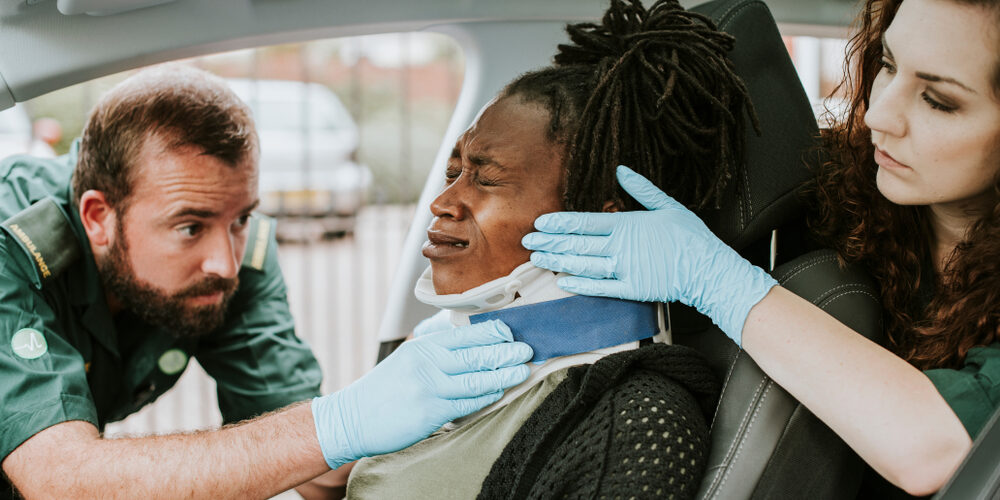A frequently neglected aspect of a crash is the psychological impact on the individuals involved. In some, but not all cases, the stressful and traumatic events of a road traffic accident can induce a psychological injury. Primarily because the events of a crash are so far from the realm of ordinary experiences, they can cause a psychological injury such as post-traumatic stress disorder (PTSD), anxiety, depression or adjustment disorders.
Similar to a physical injury, these conditions can have life-changing effects, which can occasionally be even more debilitating than a physical condition. The two often accompany each other in a claim, but can also be made independently. However, for a claim to psychological trauma to be valid, the relevant symptoms of the condition must persist for a significant period of time (i.e. weeks or months) after the traumatic incident in question.
Most personal injury claims are for physical injuries, but as society is starting to be more aware and understanding of psychological disorders, it is becoming increasingly acceptable to claim for psychological impacts. To claim for this, the impacts must have been directly caused by a traumatic incident that occurred because of someone else’s negligence. There is also a limitation period of three years.
Symptoms
Psychological conditions are highly variable, what one individual experiences after a crash may be in complete contrast to what another person experiences. Extensive examination by a physician is needed to diagnose the physiological impact of a crash accurately. Once a specific condition has been identified, steps can be taken to assess the severity and thereafter, put in a personal injury claim.
In certain cases, an individual may already be suffering from a psychological disorder. This type of situation is becoming more common, for example, one in five (20%) of Australians aged between 16 and 85 experience a psychological disorder in any year.
Depression, anxiety, and substance abuse disorder are the most common by far, and often occur in combination. In such a case, for your claim to be valid after a crash, the displayed symptoms must have worsened substantially as a direct result of the accident, or be different in nature.
PTSD
In the case of PTSD, the existence of the symptoms can have a significant impact on your daily life, typically developing during the first month after a crash. However, in a minority of cases, symptoms only display after several months or even years. Unfortunately, this can weaken claims for personal injury compensation. Symptoms also fluctuate between individuals, and over time as they worsen and subside.
PTSD can involve flashbacks, nightmares, and frequent distressing sensations in the form of ‘re-experiencing’. Similarly, a sufferer may find themselves in a state of hyperarousal, whereby someone may be irritable or have trouble concentrating or sleeping. However, a person with PTSD may also respond in complete contrast, by avoiding all reminders of the crash, distracting themselves, and experiencing emotional numbing.
Depression
Like PTSD, the symptoms of depression vary widely according to the individual, persisting for weeks to months. Those suffering frequently feel sad, hopeless, and lose interest in things they once enjoyed. Even mild symptoms are likely to impact on work, social, and family life, emphasising the importance of acquiring proper compensation following a crash.
Psychologically, sufferers may find themselves feeling hopeless, anxious and unmotivated. They may also feel guilt-ridden, tearful, and intolerant of others. Physical symptoms may include a loss of appetite, a lack of energy, and disturbed sleep. Individuals may also find themselves suffering socially, by avoiding social activities, neglecting interests, and experiencing family issues.
Anxiety
Generalised anxiety disorder can affect you both physically and mentally, although symptom severity does vary between individuals. It is a general feeling of unease that can worsen to such an extent after a crash that it affects your daily life.
Psychological symptoms include restlessness, a sense of dread, and difficulty concentrating. Such symptoms can be worsened by the presence of physicalities such as dizziness, trembling, sweating, and other complications.
Who Can Claim For Psychological Trauma?
Primary Victims
The majority of claimants after a crash are primary victims, who are people directly involved in a crash and are suffering from psychological trauma as a result. Even the threat of a serious injury without the outcome can induce a lasting psychological impact that allows victims to claim for compensation.
Secondary Victims
Those who witness a crash and suffer psychological impacts as a result can also claim for compensation. However, the following criteria must be met:
- They have a close tie of love and affection with the primary victim of the accident
- They were at the scene of the crash during or immediately after the event
- Negligence has been proven on behalf of the primary victim of the incident
The Process Of Claiming For Psychological Trauma
Psychological injuries are highly complex and unique to each individual, making them far more complicated than claims for physical injury. When pursuing a claim, victims will likely meet with a psychiatrist who will clinically assess the extent and prognosis of the psychological impact, as well as any necessary treatment.
Therefore the success of each individual case is dependent upon the integrity of such an assessment, as well as the quality of any associated medical notes and the correlation between both factors and the account the individual provides as part of their claim.
If you have been involved in an accident on the road and need assistance with your claim, contact Motor Legal today for specialised advice.
Found this article useful? Use the links below to share or send
Have you been injured in a Motor Vehicle Accident? Request a free initial consultation via the form below.
"*" indicates required fields








